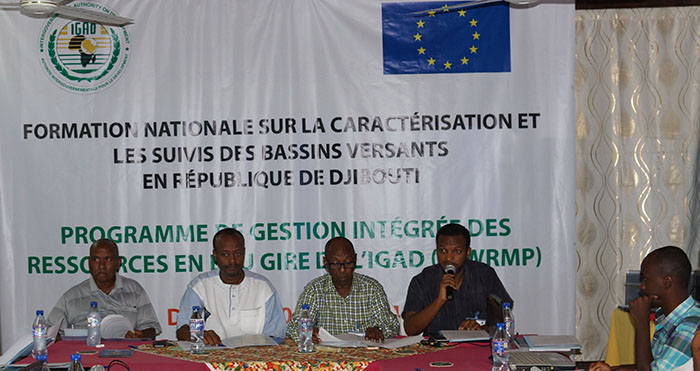
(Left) Houmed Maki Ibrahim, Abdoulmalik Mohamed Banoita, Ismael Elmi Habaneh, Daher Elmi (Right)
Tadjourah, Djibouti, 16-06-2014: A national training workshop on the characteristics and monitoring of watersheds in the Republic of Djibouti opened this morning in Tadjourah, Djibouti, in the presence of the Prefect of the Region of Tadjourah, HE Abdoulmalik Mohamed Banoita, the Program Manager of Natural Resources of IGAD, Mr Daher Elmi, and the Focal Point and Representative of the Djibouti Ministry of Agriculture, Water, Fisheries, and Livestock, Mr Elmi Ismael Habaneh .
This five-day workshop is gathering technicians and engineers from the Ministry of Agriculture, Water, Fisheries, and Livestock, the Ministry of Higher Education and Research, the Ministry of Equipment and Transport, and the Djiboutian Armed Forces in order to train them in collecting and processing information that will allow them to draw maps and hydrological monitoring of watersheds.
In his opening speech, the Prefect of Tadjourah was pleased to host this workshop in Tadjourah. “We all know how access to water is of paramount importance in our region and throughout the whole of the Republic of Djibouti. In the Region of Tadjourah for instance, we lose such a quantity of rain water we could have harvested”, he said. He added that “it is necessary to collect data on watersheds and analyse these. These data are important in the process of policy making for our government. ”
The Focal Point of the Djibouti Ministry of Agriculture for IGAD, Mr Elmi Ismael Habaneh, first of all congratulated the participants for their presence before paying tribute to IGAD for their valuable collaboration with his Ministry. He added that “the Republic of Djibouti has made rain water harvesting a national priority sustained by commitments at national and international levels with the construction of water catchments”.
Daher Elmi extended his sincere thanks to the European Union for providing “financial support and technical assistance to IGAD Inland Water Resource Management Programme (INWRMP), which initiated this workshop”. He said that this workshop would be “centred on mapping training.” “The goal is to provide a methodology that will provide tools to the decision-making spheres in support for the creation and management of the various watersheds,” he said before declaring the workshop open .


